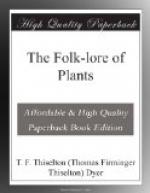“Sowing fennel is sowing sorrow.”
But why this should be so it is difficult to explain, considering that by the ancients fennel was used for the victor’s wreath, and, as one of the plants dedicated to St. John, it has long been placed over doors on his vigil. On the other hand, there is a common saying with respect to rosemary, which was once much cultivated in kitchen gardens:—
“Where rosemary flourishes the lady rules.”
Vetches, from being reputed a most hardy grain, have been embodied in the following adage:—
“A thetch will go through
The bottom of an old shoe,”
Which reminds us of the proverbial saying:—
“Like a camomile bed,
The more it is trodden
The more it will spread.”
The common expression:—
“Worth a plum,”
Is generally said of a man who is accredited with large means, and another adage tells us that,
“The higher the plum-tree, the riper the plum.”
To live in luxury and affluence is expressed by the proverbial phrase “To live in clover,” with which may be compared the saying “Do it up in lavender,” applied to anything which is valuable and precious. A further similar phrase is “Laid up in lavender,” in allusion to the old-fashioned custom of scenting newly-washed linen with this fragrant plant. Thus Shenstone says:—
“Lavender, whose spikes of azure
bloom
Shall be, erewhile, in arid bundles bound,
To lurk amidst the labours of her loom,
And crown her kerchiefs clean with micklc
rare perfume.”
According to Gerarde, the Spartans were in the habit of eating cress with their bread, from a popular notion very generally held among the ancients, that those who ate it became noted for their wit and decision of character. Hence the old proverb:—
“Eat cress to learn more wit.”
Of fruit proverbs we are told that,
“If you would enjoy the fruit, pluck not the flower.”
And again:—
“When all fruit fails, welcome haws.”
And “If you would have fruit, you must carry the leaf to the grave;” which Ray explains, “You must transplant your trees just about the fall of the leaf,” and then there is the much-quoted rhyme:—




